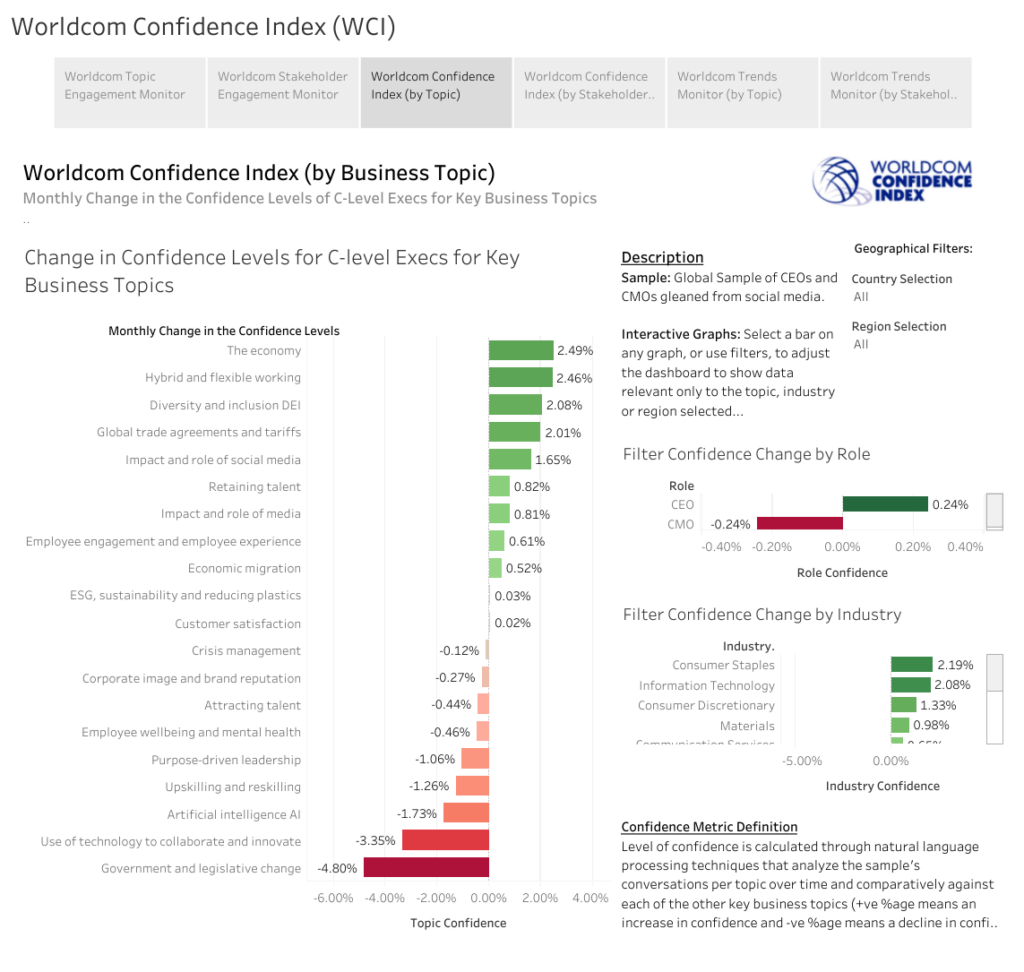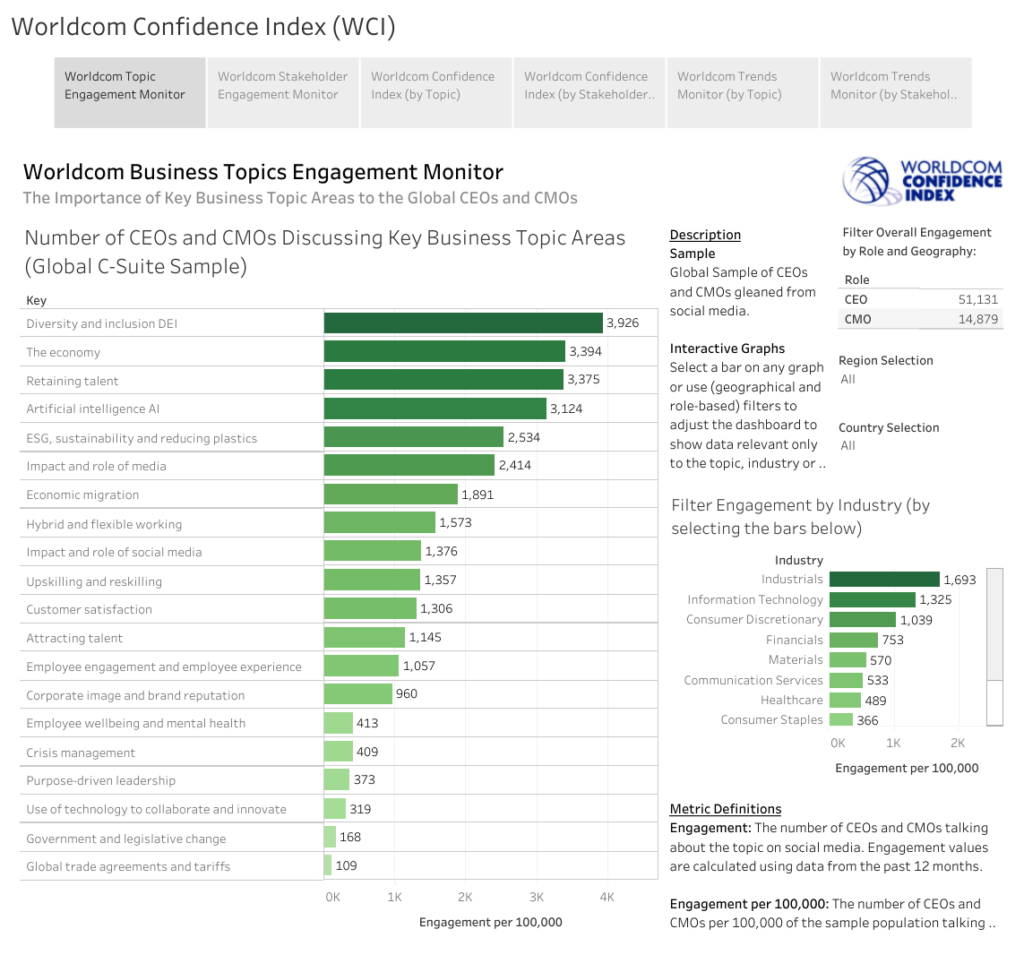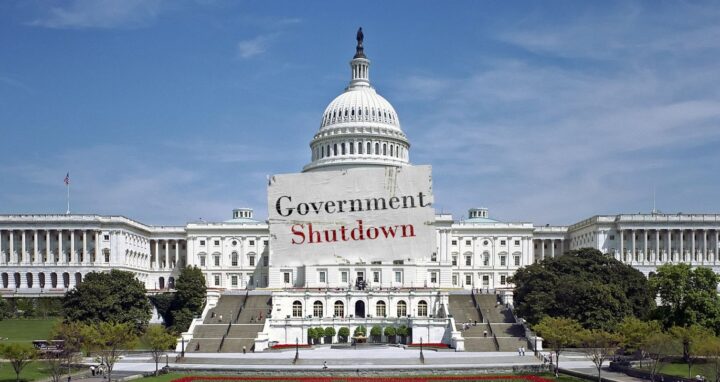Four people-related crises to avoid in 2024
After three years of seemingly one crisis after another, leaders seem to feel less well versed in handling a crisis. This is borne out by the latest Worldcom Confidence Index data which shows business leaders losing their confidence in crisis management (see chart 1). So are organisations ready to handle the next crisis that comes their way? Most are not, according to this article in Forbes which highlights that only 49% of surveyed U.S. companies have a formal crisis communication plan. Another 28% have an informal (i.e., undocumented) crisis communications plan, and almost a quarter (23%) don’t have one at all—or are not confident that they have one.
That’s why Worldcom partners created the SALUS crisis preparedness and protection service, available in one or multiple countries – see more here.
So, armed with the latest confidence rankings from the Worldcom’s Global Business Leaders Confidence Index (WCI), we asked Worldcom’s crisis management experts to pick the four people-related topics that are most likely to be a cause of brand, reputation and leadership damage.
1. Failing to prevent the reputational threats that come from downsizing the workforce
The global economic crisis is forcing organisations to review their people’s needs. And some organisations have already made redundancies. It’s therefore not surprising that the latest WCI data has retaining talent as the third most important topic for global leaders.
Layoffs may be unavoidable, as companies try to adapt to tough market conditions and changing customer needs. But these changes mean that retaining the most skilled employees and attracting new skills will be a high priority.
So, we recommend that all organisations develop a communications strategy for their short, and long term, people needs. This strategy must take account of any planned changes (such as layoffs) so that the risk of negative reactions is minimised. It must also take into account some of the topics below – such as DEI and upskilling – if the organisation is to succeed in retaining its brightest talent and attracting the new skills it needs to succeed.]
2. Mismanaging expectations around hybrid and flexible working
Organisations all around the world acted very quickly to the shock of the pandemic and adopted new ways of working. This helped businesses survive but it also changed the attitudes of employees to their relationship with work and how it could be best performed.
Some employers have started to insist that people return to an office environment on a full time or near full time basis. The decision by Zoom to demand employees are in the office – as reported in this article – Zoom tells staff to come into the office at least two days a week | Zoom | The Guardian shows how what appears to be an internal decision can actually become a brand reputation problem.
So, we recommend that organisations take a people-first and not property-first approach to their operational decisions. By listening to your people, understanding their attitudes to flexible working, and adjusting the way people work to improve personal and organisational performance and connectedness, you will be less likely to experience a crisis in 2023.
3. Failing to be an employer of choice by failing to upskill and reskill your people to keep your best talent
As identified above, the battle for in-demand skills is intensifying in 2023 – particularly with the expansion of generative AI technology. In the pre-pandemic world, this would normally have led to aggressive and high-profile recruitment techniques. But, to avoid increasing the risk of a people-related crisis, it makes sense to address this skills gap from the inside, by upskilling employees. As research highlighted in Forbes shows, investing in employee development in this way will encourage employees (particularly Gen Z) to stay loyal. The article points out that ‘a buffet of valuable training opportunities can inspire workers of all ages to skill up—and stay put’. This hire from within approach, what an article in the Harvard Business Review calls ‘quiet hiring’, will protect organisations from claims that it is turning its back on current employees.
So, we recommend organisations are proactive in identifying ways to upskill and reskill their people rather than focus on external recruitment. It will significantly reduce the likelihood of employee dissatisfaction, and the consequent external brand damage that comes from not being seen as a people-first organisation.
4. Failing to take a balanced approach to diversity, equity and inclusion (DEI)
Diversity, Equity and Inclusion (DEI) has received a lot of attention from global leaders in the last three years and has been at the top of the Worldcom Confidence Index in terms of leader engagement for over a year. As a result, most organisations have been taking steps to be more inclusive. But these efforts are not always universally well received. Research highlighted in the Harvard Business Review found that 42% of employees believe their organization’s DEI efforts are divisive.
So, we recommend it makes sense to assess if DEI policies and changes are having the right impact in terms of employee happiness, organisational performance and brand perceptions. To not do so could expose the organisation to unnecessary risks in 2023 and lose the support of key stakeholders, including consumers, employees and investors.
Be prepared for the main risks you face
These four risks focus on people-related issues. But there are other topics on Worldcom’s Confidence Index of global leaders that have lower confidence than the areas highlighted above, so we recommend that every organisation audits their exposure to risk based on their own context.
Being PREPARED for the issues that are most likely to come your way will significantly reduce the likelihood of brand and business damage from a crisis.
That’s why Worldcom partners created the SALUS crisis preparedness and protection service.
Protecting your business, brand and reputation needs an EXPERT approach from crisis and issues specialists who understand your local and global context. Our crisis experts can deliver emergency response to minimize damage but prefer to focus on getting you prepared so issues never become a crisis.
If you’d like help to get prepared for the worst that 2023 can throw at you, or if you need crisis help right now, contact [email protected] or our crisis experts in your local markets.






